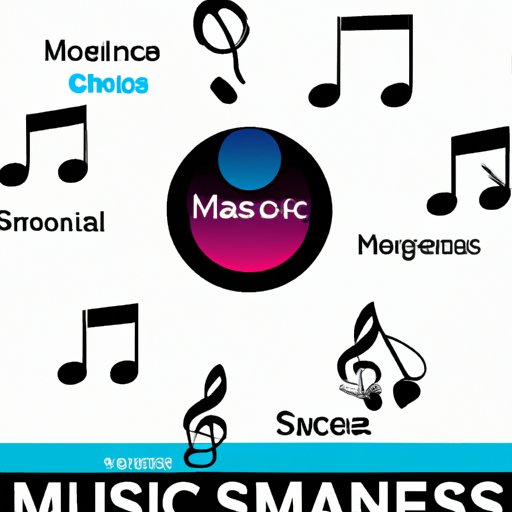Introduction
Stress is a common problem faced by many people in today’s world. Stress management is an important skill that can help individuals cope with the effects of stress and lead healthier and happier lives. Music has been used for centuries as a tool to reduce stress and anxiety. Studies have shown that listening to music can have a powerful effect on our mental and physical health, helping us to relax and reduce stress levels.

Exploring the Psychological Benefits of Music for Stress Relief
Music can have a profound effect on our emotions and moods. Different types of music can evoke different feelings and reactions from us. Listening to upbeat music can make us feel energized and positive while slow, soothing music can help us to relax and unwind. Music can also help to distract us from negative thoughts and worries, allowing us to refocus our attention on something more positive.
In addition to its emotional benefits, music can also help to improve cognitive performance and memory. Studies have shown that listening to music can improve focus and concentration, which can be especially helpful when dealing with stressful situations. Listening to music can also help to boost creativity and motivation, which can be beneficial when trying to solve problems or when tackling difficult tasks.

The Role of Music in Stress Reduction and Relaxation Techniques
Music can be used as a tool for refocusing attention and can be incorporated into various relaxation techniques. For example, guided imagery is a technique where an individual visualizes a peaceful scene while listening to calming music. This can be a helpful way to reduce stress and anxiety and to promote relaxation. Other relaxation techniques such as progressive muscle relaxation, deep breathing, and meditation can also be enhanced with the use of music.
Different types of music can be used for stress relief. Classical music, nature sounds, and ambient music are all popular choices. Instrumental music without lyrics can be particularly effective because it can provide a sense of calm without being too distracting. It is important to find the right type of music for you; some people may find certain types of music to be more calming than others.
Understanding the Power of Music to Reduce Stress Levels
Studies have shown that listening to music can have a powerful effect on our bodies. Listening to music has been found to lower heart rate and blood pressure, which are both indicators of stress levels. Music can also help to reduce anxiety and muscle tension, which can be beneficial for those suffering from chronic stress.
Music has also been found to be effective in reducing pain. Studies have shown that listening to music can help to reduce the perception of pain and can even increase tolerance of pain. This can be especially helpful for those who suffer from chronic pain due to stress or other medical conditions.

Using Music To Manage Stress and Improve Mood
Listening to music on demand can be a great way to manage stress in the moment. Whether you are at home, at work, or on the go, you can access your favorite music whenever you need it. There are also many streaming services available that offer playlists specifically designed to help with stress relief.
Making music part of your daily routine can also help to reduce stress levels. Listening to music while doing chores, exercising, or just taking a break from work can be a great way to relax and unwind. Incorporating music into your day-to-day life can also help to improve your overall mood and outlook.
How Listening to Music Can Help You Manage Stress
Finding the right music for you is an important step in managing stress. Experiment with different types of music and find the ones that work best for you. Establishing a regular listening schedule can also be beneficial; try to find a time each day that works best for you and make it a habit to listen to music during that time.
It is important to remember that everyone responds differently to music and that it might take some trial and error to find what works best for you. If you find that music is not helping you to manage your stress, consider talking to a professional about alternative options.
Conclusion
Music has been used for centuries as a tool for stress relief and relaxation. Studies have shown that listening to music can have a powerful effect on our mental and physical health, helping us to relax and reduce stress levels. Music can help to change moods, improve cognitive performance, and reduce anxiety and muscle tension. Incorporating music into your daily routine can be a great way to manage stress and improve your overall mood.
If you are looking for ways to manage stress, consider adding music to your stress management plan. Finding the right music for you and establishing a regular listening schedule can help you to reap the benefits of music for stress relief. Remember that everyone responds differently to music, so it might take some trial and error to find what works best for you.
(Note: Is this article not meeting your expectations? Do you have knowledge or insights to share? Unlock new opportunities and expand your reach by joining our authors team. Click Registration to join us and share your expertise with our readers.)
